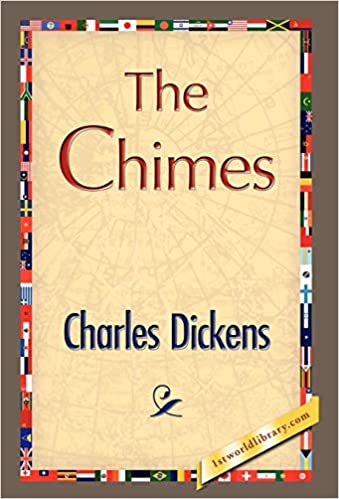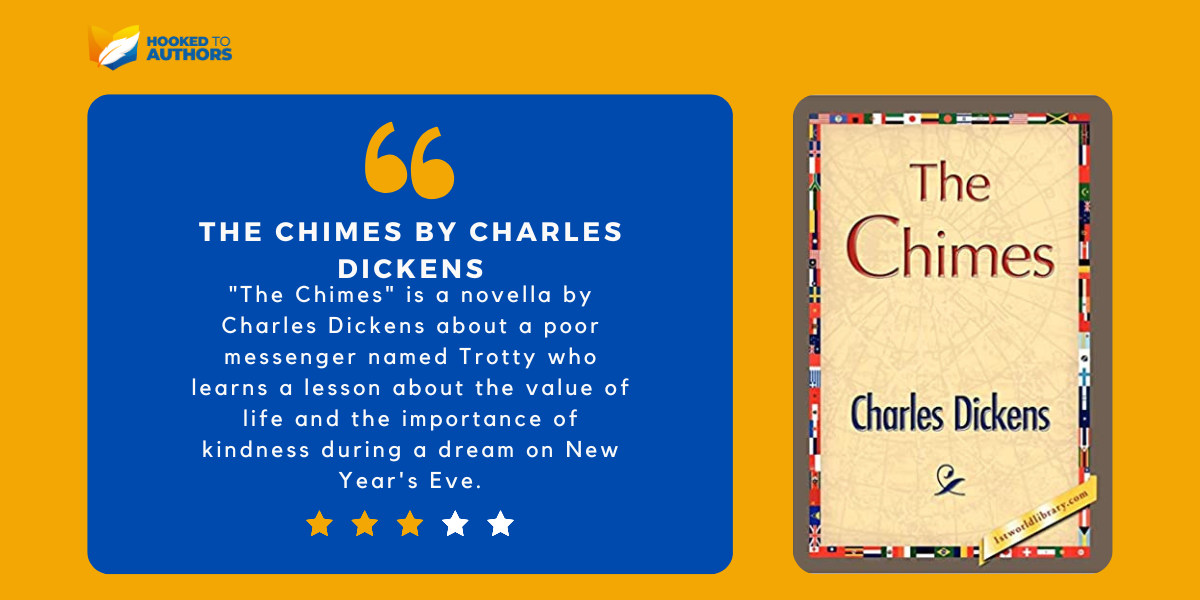The Chimes, which is also known as The Chimes: A Goblin Story of Some Bells that Rang an Old Year Out and a New Year In, is the second installment in the series of Christmas stories written by Charles Dickens.
The novella was published in 1844, a year after the release of A Christmas Carol. This was keeping in line with the stories Dickens published in the 1840s that had solid moral and social messages.
The other books in the Christmas series include The Cricket on the Hearth, The Battle of Life, and The Haunted Man and the Ghost’s Bargain. It was in late 1844 that Dickens crafted this book while visiting Italy for a year.
John Forster, who was the author’s first biographer, recalled saying that Dickens was wondering about the title to give to his next Christmas story and the kind of structure to go for. Inspiration struck him when he heard the church bells ringing from the villa he was staying at in Italy.
Due to this reason, the theme of bells is evident in the novella through the four parts it’s divided into, with the parts being called ‘quarters’ after the clock’s quarter chimes.
Two days after being inspired by the sound of the bells, Forster received a letter from the writer containing a brief message about chimes, and that’s how the writing process began for the book.
In December of 1844, Dickens got back to London for a week, which is when he gave readings of the finished copies of The Chimes to his friends to get their thoughts and opinions before the novella was sent for publication.
One of these readings was recorded in the form of a popular sketch by an Irish painter named Daniel Maclise. In this article, we will be discussing the story and themes of this beloved story.
| Title | The Chimes |
|---|---|
| Author | Charles Dickens |
| Publication Date | 1844 |
| Genre | Novella, allegory |
| Setting | London, England during New Year's Eve |
| Protagonist | Toby Veck |
| Antagonist | The spirits of the bells |
| Major Themes | Social injustice, poverty, redemption, the power of memory |
| Plot Summary | Toby Veck is a poor messenger who becomes disillusioned with life and loses faith in humanity. On New Year's Eve, he hears the chimes of a local church and is transported to a world where the spirits of the bells show him the possible outcomes of his actions. Toby is forced to confront his own biases and prejudices as he witnesses the consequences of his choices. In the end, he realizes the value of his own life and the importance of compassion and empathy. |
| Major Characters | Toby Veck, Meg, Lilian, Richard, the spirits of the bells |
| Literary Significance | The Chimes" is a lesser-known work by Dickens but is still considered a classic of English literature. The novella offers a powerful critique of the social injustices of the time and explores themes of poverty, redemption, and the power of memory. The novel's allegorical elements and its use of the supernatural to convey moral messages are also notable. "The Chimes" remains a thought-provoking and relevant work today. |

The story of The Chimes begins by introducing the readers to Toby Veck, the protagonist of the novella. Everyone knows him as Trotty Veck, a sixty-year-old, poor man who earns his living as a messenger and porter. He is given this nickname since he is always trotting about from one place to another.
Trotty is seated on the steps of a church located near his home. As he waits for his daughter, Meg, to get him some lunch, he reads the daily news but is upset and horrified at the magnitude of crimes taking place. They make him wonder how wicked the people belonging to the working class truly are.
Once Meg arrives, she tells her father of her decision to get married the next day to Richard, her long-term boyfriend. Although Trotty is not pleased about this development, he attempts to hide his feelings about it from his daughter.
The readers then get to meet Cute, the local magistrate, who arrives at the scene along with some rich men. They begin to inquire Trotty and Meg about their lives, making it very evident that they find them to be merely people to be curious about, owing to their class.
Since Trotty and his daughter belong to a lower class compared to these men, they also find the father-daughter duo to be a potential risk to the so-called classy society. This interaction makes Meg wonder if it’s wise for two poor individuals like Richard and herself to get married to one another.
Trotty is sent to carry a message from Cute’s side to Sir Joseph Bowley, who is a Member of Parliament. Upon reaching his place, Sir Joseph constantly keeps showing off to Trotty how he is already clearing his debts before the beginning of the new year.
He goes ahead and asks Trotty if he has paid off all his debts yet, which immediately embarrasses him, and he admits that he still has to pay back a small sum to his local shop.
Trotty begins to wonder if he even has any importance while also wondering if the other people are actually worthless. While going back, Trotty crosses paths with Will Fern, a financially deprived countryman who has been accused of being a vagrant.
Fern is accompanied by Lilian, his niece, who is an orphan. They are on their way to Cute with the hope of receiving help. Trotty, however, warns him of Cute’s plan to have him arrested. He suggests they stay with him and Meg for the night, and they share their meals with them too.
That night, Trotty feels as if his name is being called out by the bells of the church nearby. Since the bell tower’s door is unlocked, he climbs to the top and discovers that an individual goblin attendant is assigned to each bell.
They reprimand him for losing faith in the ability of human beings to get better and inform him that he is actually dead after falling down on his way up the bell tower. He is then made to see multiple visions that showcase what the future lives of his loved ones look like after his death.
Since he is dead, he cannot attempt to stop them from making mistakes. Richard becomes addicted to alcohol to deal with the sadness of not being able to marry Meg. Even though they eventually marry, Richard dies with no money whatsoever, leaving Meg with a child.
Due to the unfair laws, Will often gets locked up in prison, thereby forcing Lilian to become a prostitute to earn a living. The final vision he sees is the cruelest one, wherein Meg is trying to drown herself and also her child.
Unable to bear this, Trotty cries out and pleads to the goblins not to let her daughter and grandchild die, saying that he has learned his lesson. Just then, he realizes that he can touch Meg and therefore stops her from committing suicide.
In that moment, Trotty wakes up in his home, and realization dawns on him that these visions were meant to lend him an epiphany about life. He understands that not everyone is wicked and that some become so, often due to circumstances or choices.
The novella ends with the characters celebrating New Year’s Day with the wedding of Meg and Richard.
Book Review of The Chimes
Christmas stories fill our hearts with a sense of warmth, making us dream and have faith that things will indeed get better. This is the very feeling that Dickens wanted to induce in his readers through the story of The Chimes and all the other Christmas stories in this series.
Through the character of Trotty, we see someone who has lost faith in humanity and believes that the future is very bleak. Meg and Richard serve as symbols of youth and hope, the kind of hope that is soon erased due to the reality and pressures of adulthood.
The subjects of social inequality and class distinction are evident in this novella as well, as seen from the oppression of the upper class towards the citizens who belong to a lower class. An example of this is presented through the comments heard by Trotty from Cute or even the way Cute wants to arrest Fern.
Prostitution and the treatment of women is addressed through the character of Lilian. Dickens provides a social commentary and a picture of the Victorian era through this heartfelt story.
Characters In The Novel “The Chimes”

The characters present in The Chimes are unique in their own way. They are as follows:
1. Toby/Trotty Veck
The protagonist of the novella. He works hard to earn a living for himself and his daughter and begins to wonder about the wicked nature of the working class. Frustrated and disappointed by the situations of suffering and poverty, he loses faith in people. However, through the course of the story, he realizes that not all hope is lost.
2. Meg Veck
Trotty’s daughter. She is a loving and caring individual who is devoted to her father and is extremely in love with her partner, Richard, whom she wishes to marry and have a family with.
3. Alderman Cute
A local magistrate. He is a cruel and cunning man who derives pleasure by poking puns at individuals belonging to the working class. His interactions with Trotty leave the latter feeling miserable.
4. Sir Joseph Bowley
A Member of Parliament. He doesn’t shy away from constantly boasting about his wealth, choosing to remain blissfully unaware of the struggles of working-class individuals.
5. Will Fern
A poor countryman. He is wronged throughout the novella despite no fault of his own. His character shows how society is unfair to people who don’t come from a higher class in society. Dickens paints a picture of certain elements of Victorian society through the character arc of Fern.
6. Lilian Fern
Will’s orphaned niece. During his visions, Trotty sees that Lilian has become a prostitute to feed herself, thereby pointing out the bleak conditions that the women during that era had to live in just to survive.
Famous Quotes From The Book

Charles Dickens was known for his writing, dialogues, and creating memorable interactions between the characters of his books. The Chimes, too, is filled with quotes that the readers will remember even after devouring the story. Some of those quotes include:
“So may the New Year be a happy one to you, happy to many more whose happiness depends on you!”
“For the night-wind has a dismal trick of wandering round and round a building of that sort, and moaning as it goes; and of trying, with its unseen hand, the windows and the doors; and seeking out some crevices by which to enter.”
“That I growed up a man and not a beast says something for me.”
“The Spirit of your child bewails the dead, and mingles with the dead – dead hopes, dead fancies, dead imaginings of youth, but she is living. Learn from her life, a living truth. Learn from the creature dearest to your heart, how bad the bad are born. See every bud and leaf plucked one by one from off the fairest stem, and know how bare and wretched it may be.”
Adaptations
The adaptations of The Chimes are listed below:
- A 1914 silent movie which was directed by Thomas Bentley
- A 2000 clay-animated movie by Xyzoo Animation
- A 2004 stage adaptation which was developed by Les Smith
- A 2022 audio dramatization where Trotty Veck was played by Toby Jones
Conclusion
The bibliography of Charles Dickens is populated with somber stories and serious discussions. However, the writer also had a knack for including comical elements and uplifting messages amidst these books, and The Chimes is one such story that gives the readers hope and makes them smile.
Reading Dickens’ novellas is just as interesting as reading his full-length novels, and if you’re ever in the mood to enjoy a shorter Dickensian story, The Chimes is the perfect one to pick up.

